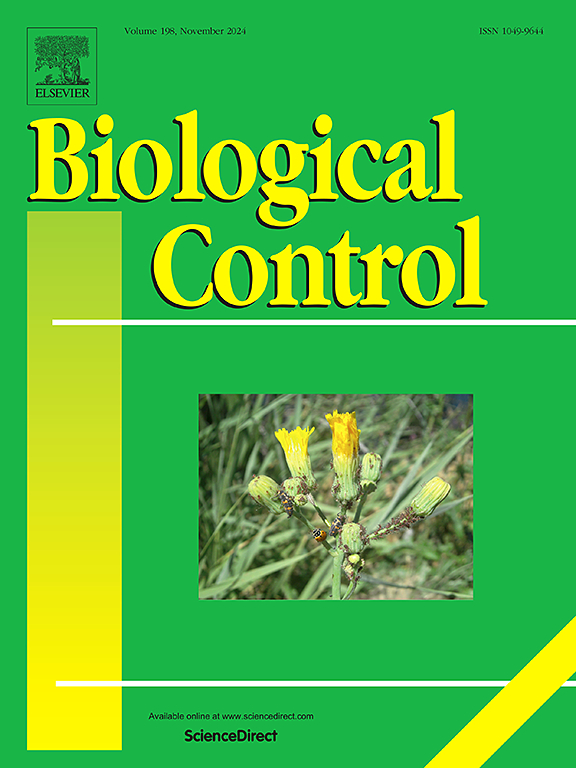调节生物防治剂对饲养寄主和植食性微生物的影响
IF 3.4
2区 农林科学
Q2 BIOTECHNOLOGY & APPLIED MICROBIOLOGY
引用次数: 0
摘要
寄主的成虫前调节和植-草食线索的成虫调节可诱导拟寄生物的表型可塑性。这在先发制人的生物防治中尤其重要,因为在目标害虫到达之前,拟寄生虫可能在替代宿主上大量饲养。本研究评估了卵寄生物日本三翅虫(Trissolcus japonicus, Ashmed)在其外来目标寄主Halyomorpha halys (stastal)或备用寄主Dolycoris baccarum l(均为半翅目:Pentatomidae)上饲养对其觅食行为的影响。雌性拟寄生物被测试naïve(没有事先暴露于植物-宿主线索),或者在一个由蚕豆植物组成的微观世界中持续暴露于任何一种臭虫的摄食后一周。在嗅觉实验中,饲养在大褐家蝇上的拟寄生蜂对这两种微环境都没有先天的反应,但条件反射的拟寄生蜂会被用于条件反射的同一种微环境所吸引。寄生物对相应的微观世界表现出天生的吸引力,而条件作用只对halys产生积极的反应。在捕蝇场,不论饲养的寄主是什么,日本夜蛾都倾向于选择黄颡鱼的成虫痕迹。进一步的研究应评估不同生态相关情景下的拟虫反应,同时考虑植物携带臭虫卵以及在调节过程中对拟虫的潜在产卵奖励。我们的研究结果表明,一旦获得预释放许可,日本刺虫就可以在第一次检测到目标宿主时在替代宿主上饲养,为其释放做准备,并且对宿主相关线索的预先调节可能会确保寄生蜂对目标种群的远距离定位。本文章由计算机程序翻译,如有差异,请以英文原文为准。
Conditioning the biocontrol agent Trissolcus japonicus on rearing hosts and plant-herbivore microcosms affects its foraging behaviour
Pre-adult conditioning on rearing hosts and adult conditioning on plant-herbivore cues can induce phenotypic plasticity in parasitoids. This is particularly important in pre-emptive biocontrol, when parasitoids may be mass reared on alternative hosts prior to the arrival of the target pest. We evaluated how rearing the egg parasitoid Trissolcus japonicus (Ashmed) (Hymenoptera: Scelionidae) on its exotic target host, Halyomorpha halys (Stål), or on the alternative host, Dolycoris baccarum L. (both Hemiptera: Pentatomidae), affects its foraging behaviour. Parasitoid females were tested naïve (without prior exposure to plant-host cues), or after one week of conditioning on a microcosm consisting of a Vicia faba L. plant continuously exposed to feeding by either stink bug. In the olfactometer, parasitoids reared on H. halys did not respond innately to either microcosm, but conditioned parasitoids were attracted to the same type of microcosm used for conditioning. Parasitoids reared on D. baccarum exhibited innate attraction to the corresponding microcosm, whereas conditioning induced positive response only to H. halys. In arrestment arena, T. japonicus preferred H. halys adult traces, regardless of the rearing host. Further studies should evaluate parasitoid responses in different ecologically relevant scenarios, also considering plants bearing stink bug eggs and the potential oviposition reward for parasitoids during conditioning. Our results suggest that, once pre-release approval is granted, T, japonicus can be reared on the alternative host in preparation for its release at the first detection of the target host, and that prior conditioning on host-associated cues would likely ensure parasitoid long-distance location of the target population.
求助全文
通过发布文献求助,成功后即可免费获取论文全文。
去求助
来源期刊

Biological Control
生物-昆虫学
CiteScore
7.40
自引率
7.10%
发文量
220
审稿时长
63 days
期刊介绍:
Biological control is an environmentally sound and effective means of reducing or mitigating pests and pest effects through the use of natural enemies. The aim of Biological Control is to promote this science and technology through publication of original research articles and reviews of research and theory. The journal devotes a section to reports on biotechnologies dealing with the elucidation and use of genes or gene products for the enhancement of biological control agents.
The journal encompasses biological control of viral, microbial, nematode, insect, mite, weed, and vertebrate pests in agriculture, aquatic, forest, natural resource, stored product, and urban environments. Biological control of arthropod pests of human and domestic animals is also included. Ecological, molecular, and biotechnological approaches to the understanding of biological control are welcome.
 求助内容:
求助内容: 应助结果提醒方式:
应助结果提醒方式:


